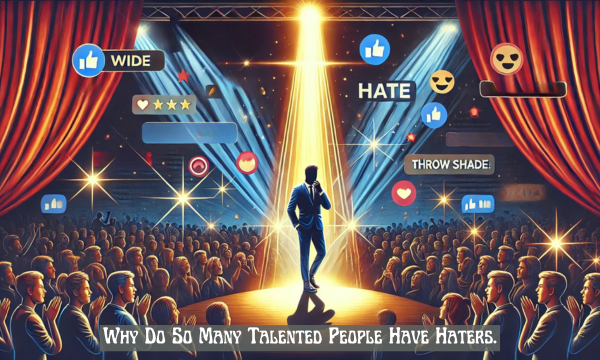The Hater Paradox: Why Success Attracts Shade in 2025
“They don’t hate you because you’re wrong; they hate you because you’re right.” In a world where AI assistants write viral tweets and teenagers become overnight crypto millionaires, one thing remains eternally consistent: success attracts haters like moths to a flame. But why? Let’s dive deep into the psychology behind the love-hate relationship society has with talented individuals, and why your haters might just be your biggest fans in disguise.
The Digital Age Dilemma: When Success Goes Viral
In 2025 the triumphs of our society have never been so obvious yet equally under social media investigation. Our talented individuals navigate through two major technological advancements while confronting critical analysis from a novel perspective. Every triumph on social media now appears as a dual event combining praise with instantaneous evaluation while delivering online criticism for each victory.
Contemporary success represents an entirely different challenge than it did several years ago. Talent now needs to display itself publicly instead of developing silently in isolated global niches. Outstanding capabilities now broadcast across billions of screens throughout the worldwide digital domain with immediate effect. This unprecedented visibility has created a peculiar phenomenon: Extremely talented people experience growth in their group of detractors. Any person who reaches success in our modern era faces negative criticism despite their achievements because Gen Alpha creators and quantum computing geniuses receive increasing levels of public scrutiny.
As innovation transcends boundaries through our modern connected society both success can quickly generate buzz and correspondingly attract harsh criticism. Algorithms both magnify accomplishments and double down on condemning performance creating a perfect visibility-vulnerability dynamic. Virtual reality influencers alongside augmented reality artists encounter polarized reactions from their audiences because those same followers celebrate creativity in these works but break them down at the same time.
The Psychology Behind the Hate: Mirror, Mirror on the Wall
Why do logical-seeming individuals send harmful energy toward superior performers? The solution emerges from a set of intricate psychological processes which scientists have devoted their efforts to study over multiple decades. Modern neural-mapping research reveals strong brain-Based evidence that observing exceptional abilities in others causes the body to exhibit similar stress signs like physical risks.
People display a stable pattern of psychological complexity although it remains challenging to understand. Experiencing people who outperform us in matters we deem important requires us to examine what we lack personally. The inner feelings of weakness elicit sour disapproval instead of appreciative acknowledgments because negative communication feels more natural to humans. The rise of envy through digital channels led psychologists to create two new diagnostic labels which describe envy reactions in the current technological era: “virtual achievement aversion” and “social media success syndrome.”
Neuroscience research today shows that observing others win activates pain-regarding areas in the brain which specifically trigger when their achievements match personal ambitions. People experience the biological reaction alongside continuous social media interactions with successful content which creates an uncontrollable emotionally charged environment. The result? People in this current generation both applaud and condemn achievement even though they fail to detect the paradox in their conflicting conduct.
The Self-Hate Connection: When Mirrors Turn Dark
Does targeting successful individuals actually show personal dislike toward oneself? Understanding this answer requires some careful evaluation. External negativity toward skilled achievers can often function as people’s subconscious way to express inner doubts and unsettled frights. People would rather attack Elon Musk’s new venture or a viral content producer’s achievements instead of evaluating their own unrealized potential.
Current psychological research linksnegative reactions toward well-performing people directly to how people feel about themselves. People who maintain low self-esteem react strongly to public demonstrations of success from others. Mystifying forms of psychological projection emerge when we relate our darkened fears to others who show glimpses of potential. The digital era has intensified this natural inclination by producing numerous social media platforms where users experience endless potential for internal conflict expression and endless comparison possibilities.
Self-hatred and criticism of others connect more deeply to our digitally fueled culture as we progress. Digital technology now produces informal potential versus achievement division because it combines AI-enhanced software with digital learning software. The clearer understanding of potential achievements creates more self-directed stress leading to outward criticism of people who reach our aspiration goals.
The Success Paradox: Why Hate Can Be a Good Sign
Here’s a truth bomb: When people hate your work it means that your viewpoint makes a difference. Strong reactions which may be either positive or negative stand as indicators of impactful activities in the attention economy that will exist by 2025. The appearance of critics serves as exceptional validation that your work matters at a level that generates a reaction even though it seems bizarre.
The mathematics of success in the digital age follows a curious pattern: Your growth in influence shifts at a constant level but your critics’ numbers dramatically enlarge beyond proportion. AI algorithms became proficient at predicting backlash impacts through suitable metrics of success so this relationship turned into a predictable pattern. Analizing this relationship allows intelligent performers to convert criticism into an evaluation of their contribution rather than an individual insult.
Due to the consistent link between success and criticism digital strategists now treat it as an essential metric for performance assessment. Today critics absence stands as a warning indicating lack of boundary breaking or meaningful impact in a company’s efforts. A paradigm shift in understanding criticism now results in a new method of managing feedback through evaluating both positive and negative engagement metrics as components of successful storytelling.
Navigating the Hate: Strategies for 2025 and Beyond
Successful individuals manage social media drama through quantum computing technology while traversing stormy waves of public opinion in our current era. Understanding how criticism reflects more of the opinion of the critic helps us discover the real value in criticism. The path toward current success necessitates both knowledge competence along with emotional competency and adaptive skills in the digital domain.
Understanding digital psychology has lead to important advancements in the most successful methods for addressing critiques. COVID-19 has led modern successful individuals toward the “integrated response strategy” which transforms criticism from harmful accusations into beneficial informational resources. Such a viewpoint helps professionals receive beneficial feedback together with the capability to remain impartial. The revolution of AI-powered sentiment analysis allows organizations to distinguish beneficial feedback from arbitrary attacks which improves the unified approach to managing public opinion.
In the year 2025 leaders need emotional intelligence capabilities to move seamlessly through physical realms alongside virtual environments. Present-day industrial leadership shows that exceptional work coupled with growth represents a more potent force than either defensive actions or counterattacks when confronted with hatred. Their commitment to their work along with genuine connections with authentic supporters demonstrates how success functions as ultimate revenge even throughout our highly connected present day.
The Future of Fame: Evolving Beyond the Hate
Future human achievement development demonstrates evolving trends regarding success versus its accompanying criticism. Decentralized platforms and machines that use artificial intelligence have transformed modern recognition systems for talent and its reception. People naturally respond powerfully to exceptional abilities regardless of whether they express admiration or criticism.
Modern fame and recognition are transforming into exciting emerging patterns. The combination of virtual reality spaces with blockchain technology enables fresh platforms where talent can flourish and sets new standards for examining and validating accomplishments. Technological progress transforms the way people deal with feedback because AI tools now offer improved feedback processing abilities they could not have accessed before. Upcoming leaders will operate as they encounter an environment characterized by consolidated boundaries between digital accomplishments and real-world success.
Throughout our journey of pushing human capabilities forward critics stay vigilant in observing achievements. Our knowledge about this connection is becoming more refined so we create smarter methods to manage negative feedback. People who harness positive reinforcement and negative criticism for personal development will lead future generations because these reactions emerge when someone brings meaningful transformation to society.
Embracing Your Impact: A Call to Action
Remember this: The people who oppose you tend to secretly admire the achievements you make. The attention you receive from haters proves how much you affect people regardless of the negative tone involved. Ever since 2025 the digital environment demands critical interaction as a marker of doing things right.
You stand with the creators and innovators and dreamers who accept being different. Ny critics stand as accidental supporters who drive your path toward becoming extraordinary. Push boundaries without limitation while breaking established patterns because your authentic self remains the only judgment that matters among all the opinions people present to you.
The time has come to transform your detractors into the motivation you need most. Pass this article to someone you think needs to read it then begin transforming perspectives on success and negative feedback. Your influence in 2025 and beyond will be evaluated through your audience both directly through supporters and indirectly through observers of your growth.
#RiseAboveTheHate #Success2025 #TalentedAndThriving #EmbraceTheCriticism #FutureOfSuccess
About the Author: This piece was crafted with the latest insights in digital psychology and success dynamics, bringing you cutting-edge perspectives on navigating achievement in our rapidly evolving world. For more thought-provoking content on success, talent, and digital age dynamics, follow us on your favorite social platforms and join the conversation.

